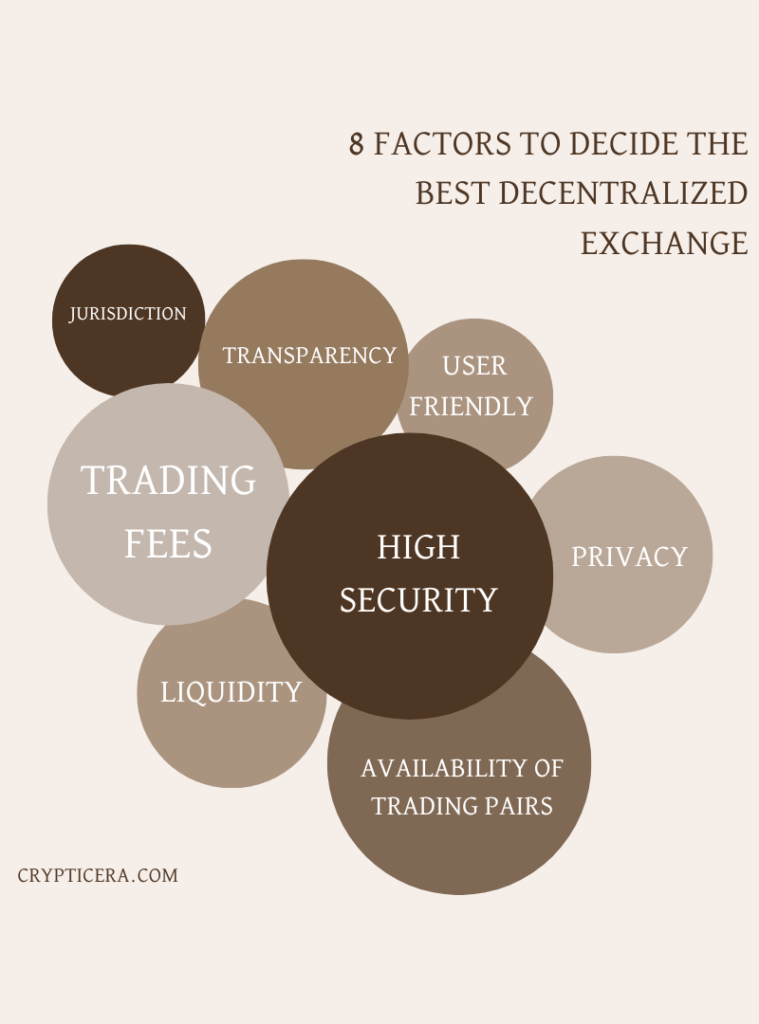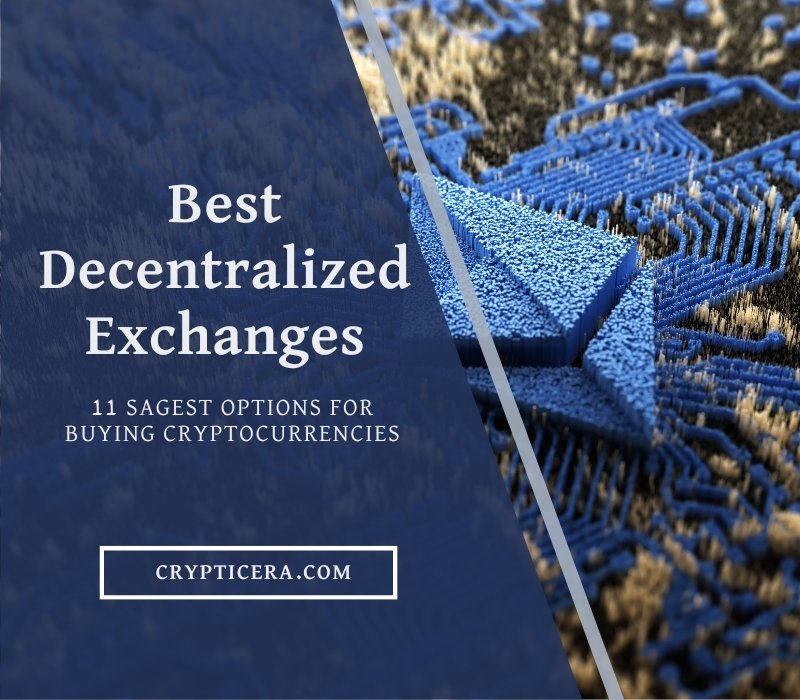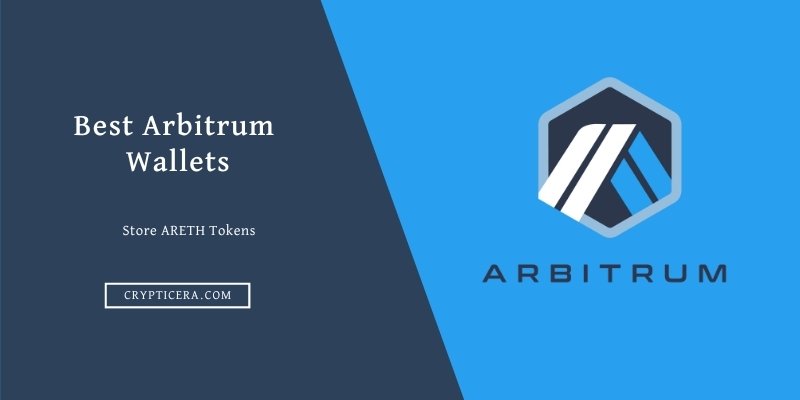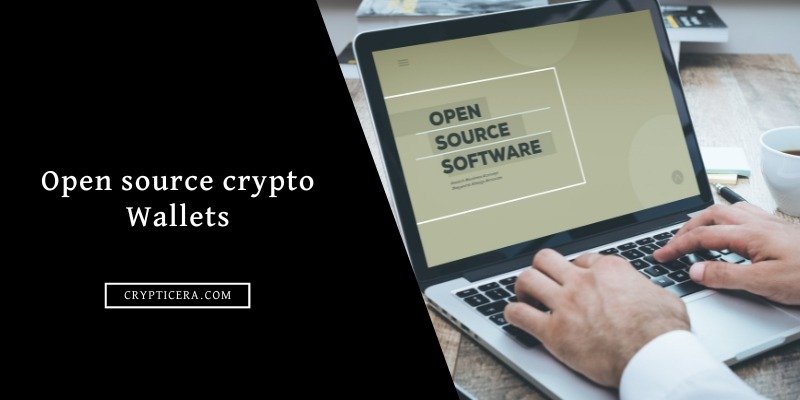In the world of cryptocurrency, decentralized exchanges (DEXs) are quickly gaining popularity as a viable alternative to traditional centralized exchanges.
These platforms offer a level of security and autonomy that centralized exchanges simply cannot match. With the rise of DEXs, it can be difficult to determine which ones are truly the best.
In this post, we’ll be diving into the top 11 best decentralized exchanges of 2023, highlighting their unique features and why they stand out in a crowded market.
How to Decide the best Decentralized Exchange?

When deciding on the best decentralized exchange (DEX), there are a few key factors to consider. These include:
- Liquidity: A DEX with high liquidity will ensure that you can easily buy and sell the assets you are interested in.
- Security: It is important to choose a DEX that has a strong track record of security and has taken steps to protect users’ assets.
- User interface: A DEX with a user-friendly interface will make it easier for you to navigate and trade on the platform.
- Trading fees: Compare the trading fees of different DEXs to find the one that offers the best value for your trades.
- Variety of tokens: A DEX that offers a wide range of tokens and assets will give you more options for trading.
- Jurisdiction: Some of the DEX are restricted in some countries, make sure to check the availability of the exchange in your country.
List of Top 11 Best Decentralized Crypto Exchanges
Here is the list of 11 best decentralized exchanges with high security, high liquidity, instant buying and selling, and open source.
- Uniswap: Best Ethereum Blockchain Decentralized crypto Exchange
- dYdX: High Trading Volume Decentralized Exchange
- Curve Finance: High TVL Best Decentralized Exchange
- Kine Protocol: Top Rated and Secure DEX
- Balancer: Best Decentralized Exchange for beginners
- Pancakeswap: Best DEX on Binance Smart Chain
- DoDo: Best DEX on Arbitrum blockchain
- ApolloX DEX: High liquidity Decentralized Exchange
- Perpetual Contract: DEX For Top Cryptocurrencies
- Sushiswap: ERC-20 Fork of Uniswap
- TraderJOE: Best Decentralized Exchange on Avalanche
Comparison between 11 Best Decentralized Exchanges of 2023
| # | No. of Coins | Exchange type | |
|---|---|---|---|
| 1 | Uniswap | 883 | Swap |
| 2 | dYdX | 10 | Orderbook |
| 3 | Curve Finance | 129 | Swap |
| 4 | Kine protocol | 16 | |
| 5 | Balancer | 147 | |
| 6 | Pancakeswap | 3812 | Swap |
| 7 | DoDo | 80 | Swap |
| 8 | ApolloX DEX | 66 | orderbook |
| 9 | Perpetual Protocol | 13 | |
| 10 | Sushiswap | 434 | Swap |
| 11 | TraderJOE | 242 | peer to peer |
1. Uniswap (V3)
- Average Trading Volume: $760,892,362
- Market Share: 39.9%
- Number of Supported Coins: 884
- Trading Fees: Three fee levels- 0.05%, 0.30%, and 1%
- Supported Cryptocurrencies: Most traded coins on Uniswap are Bitcoin (BTC), Wrapped Ethereum (ETH), and USDC.
Uniswap is one of the best decentralized exchanges (DEX) built on the Ethereum blockchain. It utilizes a unique trading algorithm known as an “automated market maker” (AMM) to allow for fast and easy trading of ERC-20 tokens.
One of the key features of Uniswap is its ease of use. The platform has a simple and user-friendly interface, making it accessible to traders of all experience levels.
Additionally, Uniswap allows for trading without the need for an account or custody of funds, providing an extra layer of security for users.
Uniswap also offers a wide range of trading pairs, with over 3,000 ERC-20 tokens available for trading. This allows for a diverse range of trading options, making it a popular choice among traders.
Another advantage of Uniswap is its liquidity. The platform has a high trading volume, which ensures that trades can be executed quickly and at a fair price.
Uniswap supports many popular crypto wallets like Metamask, Myetherwallet, etc.
Pros and Cons of Uniswap
| Pros | Cons |
|---|---|
| User-friendly interface | High trading fees during network congestion |
| No need for an account or custody of funds | Limited advanced trading features (such as stop-loss orders or margin trading) |
| Wide range of trading pairs (over 3,000 ERC-20 tokens available for trading) | Built on Ethereum blockchain (may be affected by its scalability issues) |
| High liquidity |
Exchange URL: Uniswap
2. dYdX
- Average Trading Volume: $575,730,941
- Number of Supported Coins: 10
- Trading Fees: no gas fees, different maker and taker fees
- supported digital assets: dYdX’s most traded digital currencies are Ethereum, Bitcoin, Solana, Polygon, Avalanche, and Uniswap.
dYdX is a decentralized exchange (DEX) that allows users to trade a variety of assets in a trustless, non-custodial way. It is built on the Ethereum blockchain and utilizes smart contract technology to facilitate trades between users.
One of the unique features of dYdX is its easy-to-use interface. The platform is designed with a user-friendly interface that allows even novice traders to easily navigate and execute trades.
Additionally, dYdX offers advanced trading features such as margin trading and short selling, which can be useful for more experienced traders.
In terms of security, dYdX is a non-custodial exchange which means that users retain full control of their assets at all times.
The platform utilizes smart contracts to execute trades, ensuring that users’ assets are never at risk of being hacked or stolen.
Pros and Cons of dYdX
| Pros | Cons |
|---|---|
| Decentralized | Higher fees |
| High Liquidity | Limited advanced trading features |
| Easy-to-use | No order books |
| Access to a variety of assets (including ERC-20 and ERC-721 tokens) |
3. Curve Finance
- Average Trading Volume: $263,480,861
- Number of Supported Coins: 54
- Trading Fees: 0.04% standard fees
- The platform facilitates the trading of major stablecoins such as DAI, USDC, USDT, FRAX, and TUSD through liquidity pools.
Curve Finance is another best decentralized exchange that allows users to trade various cryptocurrencies with low slippage and high liquidity.
The platform utilizes a unique algorithm called “constant product market maker” which allows for more efficient trading and lower trading fees.
Curve Finance also allows for the creation of custom pools, where users can add their assets and set their trading fees.
This allows for greater flexibility and customization for traders.
Pros and Cons of Curve Finance
| Pros | Cons |
|---|---|
| Low slippage and high liquidity | Limited number of assets available for trading |
| Efficient trading algorithm | Complex platform that may be difficult for new users to navigate |
| Customizable pools | Dependent on the liquidity of the pools created by users |
| Low trading fees | Risk of impermanent loss for liquidity providers |
4. Kine Protocol
- Average Trading Volume: $248,480,861
- Number of Supported Coins: 16
- Trading Fees: 0.1% trading fees fees
The Kine Protocol unlocks a world of possibilities for traders seeking to navigate the derivatives market.
By connecting them to a network of “general purpose” liquidity pools, backed by a diverse array of top-tier crypto assets across multiple blockchain networks, the protocol serves as a steadfast counterpart for traders of perpetual contracts.
With the Kine Protocol, traders can revel in the luxury of zero-slippage execution, bask in the security of guaranteed liquidity, and leverage up to a dizzying 100x with cross margin.
And with the ability to use collateral options such as Ethereum, Binance Smart Chain, Polygon, and Avalanche, the opportunities are limitless.
Participating in the Kine Protocol ecosystem is like being handed the keys to a treasure trove.
Users can choose to take on the role of stakers, traders, or liquidators, each of which opens the door to a unique set of rewards and benefits.
Pros and Cons of Kine Protocol
| Pros | Cons |
|---|---|
| Decentralized | Complexity |
| Synthetic assets | Risk |
| High liquidity | Ethereum network congestion |
5. Balancer (V2)
- Trading Fees: 0.0001% to 10%
- Supports more than 140+ cryptocurrencies
Balancer is a decentralized platform (DEX) that allows users to trade multiple ERC-20 tokens in a single transaction.
It utilizes a unique liquidity pool mechanism, where users can provide liquidity to a pool of tokens and receive a share of the trading fees generated by the pool.
Additionally, Balancer offers a flexible trade execution algorithm that can be customized to suit the needs of different traders.
Pros and Cons of Balancer
| Pros | Cons |
|---|---|
| Decentralized and non-custodial | Limited trading pairs (only ERC-20 tokens) |
| Liquidity pools for efficient trading and reduced slippage | Smart contract risk |
| Flexible trade execution suitable for both novice and advanced traders | Limited scalability due to the Ethereum blockchain |
| Low fees | Less user-friendly compared to centralized exchanges. |
6. ApolloX DEX
- Trading fees: 0.02% maker fee and a 0.07% taker fee
- The ApolloX exchange offers a diverse selection of perpetual trading options for its users, boasting support for over 80 different contract types. Some examples of these contracts include BTC/USDT, ETH/USDT, SOL/USDT, and many others.
ApolloX soars as the ultimate decentralized crypto derivatives destination on the Binance Smart Chain. From its inception in 2021, it has been a beacon for traders seeking a stable, reliable, and robust trading environment.
Its deep liquidity and market depth for perpetual futures trading are second to none. The platform also offers a business-to-business trading solution, the ApolloX DEX Engine, which empowers broker partners to earn commission on transaction fees.
In 2022, ApolloX took decentralization to new heights by announcing its transition to a decentralized autonomous organization (DAO) structure, solidifying its position as a leader in the decentralized trading space.
Pros and Cons of ApolloX dEX
| Pros | Cons |
|---|---|
| Faster and cheaper trades | Limited trading pairs |
| User-friendly interface | Less liquidity compared to centralized exchanges |
| Built-in wallet | order matching issues |
| Mobile app | |
| Token-based referral system |
7. Perpetual Protocol
- DEX Trading Fees: 0.10% maker and taker fee
- Supports Future trading of Bitcoin, Ether, BNB, Cosmos, Avalanche, Cardano, etc.
Perpetual Protocol is a game-changing decentralized exchange (DEX) that empowers traders to delve into the realm of perpetual futures.
The platform was first unveiled on the Ethereum scaling solution xDai and has since undergone an evolution with the launch of V2 on the Ethereum layer-2 (L2) scaling solution Optimism.
Traders on Perpetual Protocol have the opportunity to navigate a plethora of assets with leverage up to 10X and take both long and short positions.
The platform operates on a non-custodial basis, which means traders retain possession of their assets and can execute trades directly from their wallets. This added security and autonomy provide a smooth and hassle-free trading experience for all users.
Perpetual Protocol is an innovative trading arena that offers an unprecedented level of control and freedom to traders.
Pros and Cons of Perpetual Protocol
| Pros | Cons |
|---|---|
| Decentralized perpetual futures trading | Limited blockchain compatibility |
| Leverage and short/long positions | Not suitable for all types of traders |
| Non-custodial | |
| Privacy and open source | |
| Unprecedented control for traders |
8. SushiSwap
- Swap Fees: 0.3%
- It supports all ERC-20 tokens
SushiSwap is a revolutionary decentralized exchange that utilizes the power of automated market makers (AMM) through smart contracts.
This innovative approach allows for the creation of markets for various token trading pairs, all made possible by the tireless efforts of liquidity providers who supply smart contracts with the necessary capital for seamless trading.
SushiSwap was one of the pioneers in this field and was originally a fork of the popular DEX, UniSwap.
Today, it stands tall as one of the largest players in the DeFi ecosystem, available on nearly all EVM-compatible layer-one blockchains and a variety of layer-two solutions for Ethereum.
Pros and Cons of Sushiswap
| Pros | Cons |
|---|---|
| Decentralized exchange (DEX) with no central point of control or failure | Liquidity can be lower compared to centralized exchanges |
| Lower fees than centralized exchanges | User interface can be more complex for new users |
| Built on the Ethereum blockchain, allowing for fast and cheap transactions | Smart contract bugs can lead to loss of funds |
| Community-governed, allowing for decentralized decision making | Potential for front-running or other manipulative trading practices |
| Automated market maker (AMM) |
9. DoDo
- Trading Cost: 0.2-0.8% and network transaction fees
- It supports tokens on Ethereum Virtual Machine supported blockchains like Arbitrum, Avalanche, Optimism, and many others.
DoDo DEX is the best decentralized exchange (DEX) built on the Polygon, Arbitrum, and Binance Smart Chain (BSC) networks.
It allows users to trade various types of assets, including cryptocurrencies, in a trustless and decentralized manner.
One of the main features of DoDo DEX is its fast and low-cost transactions, which are made possible by the high throughput and low fees of the Polygon and BSC networks.
Additionally, the exchange offers a simple and user-friendly interface, making it easy for new users to get started.
Pros and Cons of DODO
| Pros | Cons |
|---|---|
| High throughput and low gas fees | Limited assets available for trading |
| Easy-to-use interface for new users | Less established reputation compared to older exchanges |
| Decentralized platform with trustless nature | Limited features and tools compared to centralized exchanges |
| Built on fast and reliable networks (Polygon and BSC) | Risk of smart contract exploit or security breach |
| High liquidity and trading volume on the platform. | Limited market depth and order book |
10. Pancakeswap
- Transaction Cost: 0.25%
- Supports more than 1300+ coins and tokens including BSC
- Supports digital wallets like Trust Wallet, Atomic wallet, and coinomi wallet.
PancakeSwap is a top-rated decentralized exchange (DEX) built on the Binance Smart Chain (BSC).
It allows users to trade Binance Coin (BNB) and other tokens that are built on BSC, such as Wrapped Binance Coin (WBNB), Aave (AAVE), and more.
PancakeSwap uses an automated market maker (AMM) model, where users can trade tokens without the need for a centralized order book.
Instead, trades are executed against a liquidity pool, which is managed by liquidity providers who earn a share of the trading fees.
PancakeSwap also has its own governance token, CAKE, which can be used to vote on proposals to improve the platform.
Pros and Cons of Pancakeswap
| Pros | Cons |
|---|---|
| High liquidity and low fees | Risk of impermanent loss |
| Large variety of trading pairs | Potential for front-running and flash loan attacks |
| Easy-to-use interface | Lack of regulatory oversight |
| The automated market maker (AMM) model allows for constant liquidity |
11. TraderJOE
- Transaction Fees: 0.3%
- It supports tokens on the Avalanche blockchain as well as ERC-20 Wrapped tokens like WBTC, WETH, etc.
TraderJoe is a decentralized application (dApp) built on the Avalanche blockchain network.
It is a peer-to-peer trading platform that allows users to buy and sell digital assets in a trustless and decentralized manner. It utilizes smart contracts to automate the process of trading, making it faster and more efficient than traditional centralized exchanges.
The Avalanche blockchain provides a high level of scalability, enabling TraderJoe to handle a large number of transactions simultaneously.
Additionally, the use of Avalanche’s subnets allows for increased privacy and security for users.
Pros and Cons of TraderJOE
| Pros | Cons |
|---|---|
| Decentralized exchange (DEX) | Limited selection of trading pairs |
| User control of private keys | Lower liquidity compared to centralized exchanges |
| Reduced risk of hacking or theft | Higher trading fees |
| Increased privacy and security | Limited features and tools compared to centralized exchanges |
| No need for KYC/AML procedures | Possible latency and slow trade execution |
What Is a Decentralized Exchange (DEX)?
A decentralized exchange, or DEX, is a digital asset trading platform that operates on a blockchain network.
Unlike centralized exchanges, where users must entrust their funds to a third-party intermediary, DEXs allow for peer-to-peer trading without the need for a centralized authority.
This enables greater security and autonomy for traders, as they have full control over their own private keys and funds.
Furthermore, DEXs offer unparalleled transparency and immutability, thanks to the immutable nature of blockchain technology.
Every transaction is recorded on a public ledger, providing a clear and unchangeable record of all trades.
Types of Decentralized Exchanges
There are several types of decentralized exchanges (DEXs) that operate in different ways, each with its own unique features and benefits.
The main types of DEXs include:
- Automated Market Maker (AMM) DEXs: These DEXs use algorithms to determine the prices of assets and facilitate trades. Popular examples include Uniswap and SushiSwap.
- Order Book DEXs: These DEXs use a traditional order book to match buyers and sellers. Orders are placed on a public ledger and are matched when a buyer and seller agree on a price. Examples include Kyber Network and 0x.
- Hybrid DEXs: These DEXs combine elements of both AMM and order book DEXs. They use a combination of algorithms and order books to facilitate trades.
- Decentralized Finance (DeFi) DEXs: It is built on the Ethereum blockchain and offers a wide range of financial services, including lending, borrowing, and yield farming. They enable users to earn interest on their assets and access various financial products.
- Centralized-Decentralized (CeDe) Exchanges: They use a centralized order book to match buyers and sellers, but settle trades on the blockchain, providing a degree of decentralization.
Conclusion
In conclusion, decentralized exchanges (DEXs) are rapidly becoming a popular alternative to centralized exchanges.
They offer a higher level of security and autonomy, as well as a wider range of trading options.
The best decentralized exchanges currently on the market are Uniswap, Sushiswap, and Curve, which have proven to be reliable and user-friendly platforms.
However, it’s worth noting that DEXs are still a relatively new technology, and the market is constantly evolving. As such, it’s important to do your own research and due diligence before investing in any DEX.
FAQs
What is the best DEX for crypto?
The best decentralized exchanges (DEX) are Uniswap, Sushiswap, Pancakeswap, and Kyber Network. These DEXs are having high fund security, smart contract privacy, instant order matching, and support of various decentralized crypto wallets.
Which is the popular DEX on Solana?
Serum is the most secure and high-liquidity Decentralized exchange on Solana (SOL) blockchain.
Name Popular DEXs on Ethereum Blockchain?
Uniswap, Sushiswap, and dYdX are popular Decentralized Exchanges that support all ERC-20 Tokens on the Ethereum network.



